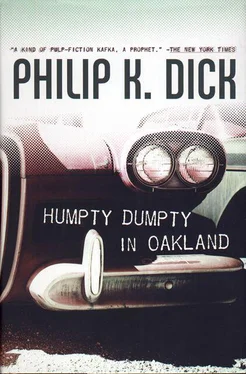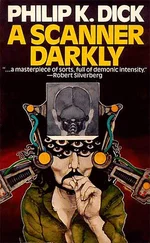But what kind of guy is that to have to spend all day with? he asked himself. Some guy monkeying around with old cars, wrecks, maybe selling one a week. Wearing the same dirty pair of jeans month in, month out. In debt to everybody; not even able to have a phone after the phone company took it away because of non-payment. And he’ll never be able to get one again, as long as he lives.
I wonder what it’s like not to be able to have a phone, he thought. To have to resign yourself to giving that up.
I wouldn’t give it up, he decided. I’d get together some money and pay off the bill and come to terms with them. After all, that’s how they make their money: selling phone service. They’d come around.
I’m fifty-eight years old, he said to himself. I’ve got a right to retire, heart or no heart. Wait’ll he’s my age. He’ll see what it’s like being scared you’re going to drop dead every time you pull a wheel off a car.
A terrible fantasy came to him then. One that he had made up before. He lay under a car; he felt it on him. He tried to breathe, to yell for help, but the weight flattened his chest. All he could do was lie, like a turtle or a bug, on his back. And then Al came along, into the garage as he always did, wandering through the side door with a part of a distributor.
Al came up to the car. He looked down. He saw the old man flat on his back, pinned under the car, staring up, unable to speak.
He stood for a minute. He did not even put down the part he carried. His eyes roamed around; he saw that the hydraulic jack had slipped, the most terrible thing possible. It had slipped out from under the differential or the hose had come loose or something; anyhow it had let the car down on the old man, and it might have been a couple of hours ago. The old man could only stare up at him; he could not even talk. His chest was completely broken. The car had crushed him, but he was still alive. He pleaded silently to be released. To be helped.
Al turned and walked off, carrying his distributor part. He went out of the garage again.
Seated at his desk, Jim felt the fear, the crushing. He kept his eyes fixed on the Volkswagen lube chart; he turned his attention to the dusty window, the nude-girl calendars, the invoices, the list of parts suppliers. But he still saw himself; he saw from outside his own prone, dying, smashed, bug-like body under the car, under the—what was it?—the Chrysler Imperial. And Al walking out.
All my life, he thought. As long as I’ve been in the garage business; I’ve been scared of it. Of the jack slipping. Being alone here, nobody coming in for hours. Maybe last thing in the day, around five p.m. And nobody coming in until next day.
But then his wife would call. Worse if it was early.
Nobody would do that, he said to himself. Leave a man pinned under a car. Just to get even. Not even Al.
I can’t tell about him, he thought. He doesn’t show his feelings. He could go either way.
And then, thinking that, he had another fantasy, one he had never had before. He saw, as clearly as before, the same scene, with Al coming in and finding him. But this time Al running, Al pulling the car off him, running to phone; then the ambulance coming, all the noise and excitement, the doctors, the stretcher, the trip to the hospital. And Al hanging around, seeing that they all did right, seeing that he was given the right medical treatment and right away. So he recovered. It was in time.
Sure, he might do that. He can work fast. Thin guys like that, who don’t carry much weight—they can really move.
But this fantasy, of Al finding him and saving him, made him feel no better. In fact it made him feel worse. But he did not know why. God damn it, he thought. I don’t need him to save me; I can take care of myself. I’d a lot rather he did walk off. It’s none of his business.
He put down the Volkswagen chart and opened the indexed pad by the phone. In a moment he had dialed his broker, Matt Pestevrides, and had the secretary on the line.
“Hello,” he said, when he had got hold of Matt. “Listen, how long am I stuck here? Now that the sales gone through.”
“Oh, you can figure on about sixty days,” Matt said in a cheerful voice. “That’ll give you plenty of time to wind up your affairs. I imagine you want to say goodbye to all your customers, all your old customers who’ve been coming in for so long. Like myself.”
“Okay,” he said, and hung up. Two months, he thought. Maybe I can come in just part of the day. And I won’t take in anything heavy. Just easy stuff to do; the doctor said so.
In front of Al’s Motor Sales, Al Miller walked back and forth, his hands in his pockets.
I knew he would, Al thought. Sooner or later. He couldn’t just turn it over to someone else to run. Once he couldn’t run it himself he had to dump it.
What now? he asked himself. I can’t patch these old jalopies up without him. I’m not that good. I’m a tinkerer, not a mechanic.
He turned and faced his lot, and the twelve cars on it. What are they worth? he asked himself. On the windshields he had written, in white poster paint, various enticing statements. “Full price $59. Good tires.” And, “Buick! Automatic shift. $75.” “Spotlight. Heater. Make offer.” “Runs good. Seatcovers. $100.” His best car, a Chevrolet, was only worth a hundred and fifty dollars. Junk, he thought. They ought to be scrapped for the parts. Not safe on the road.
Next to a ’49 Studebaker, the battery charger worked away, recharging, its black wires disappearing into the open hood of the car. It takes that to start them up, he realized. A portable battery charger. The batteries, half of them won’t hold a charge all night. They’re down in the morning.
Each morning when he arrived at the lot he had to get into each car and start it up and run the motor. Otherwise when someone came to look he would have nothing running to show them.
I ought to call Julie, he said to himself. This was Monday, so she was not at work. He started toward the entrance of the garage, but then halted. How can I talk from there? he asked himself. But if he crossed the street to the café and phoned from there, it would cost him ten cents. The old man always let him use the garage phone free, and so it was hard to face the idea of paying out ten cents.
I’ll wait, he decided. Until she shows up here at the lot.
At eleven-thirty his wife drew up to the curb in a lot car, an old Dodge with the upholstery hanging from the roof, its fenders rusted and its front end out of alignment. She smiled at him cheerfully as she parked.
“Don’t look so happy,” he said.
“Does everybody have to be as gloomy as you?” Julie said, as she hopped out of the car. She had on faded jeans, and her long legs looked thin. Her hair was tied back in a pony-tail. In the midday sunlight her freckled, slightly orange-colored face beamed its usual confidence; her eyes danced as she strode toward him, her purse under her arm. “Have you had lunch?” she said.
Al said, “The old man sold the garage. I have to close up the lot.” He heard his tone; it was as dire as possible. It was obvious even to him that he wanted to destroy her mood; he did it without guilt, too. “So don’t be so jolly,” he said. “Let’s be realistic. I can’t keep these heaps working without Fergesson. Christ, what do I know about car repair? I’m just a salesman.” In his most depressed moods he thought of himself that way: as a used car salesman.
“Who’d he sell it to?” she said. Her smile remained, but it was cautious now.
“I couldn’t tell you,” he said.
She started at once toward the entrance of the garage. “I’ll ask,” she said. “I’ll find out what they’re going to do; you don’t have sense enough to find out.” She disappeared inside the garage.
Читать дальше










